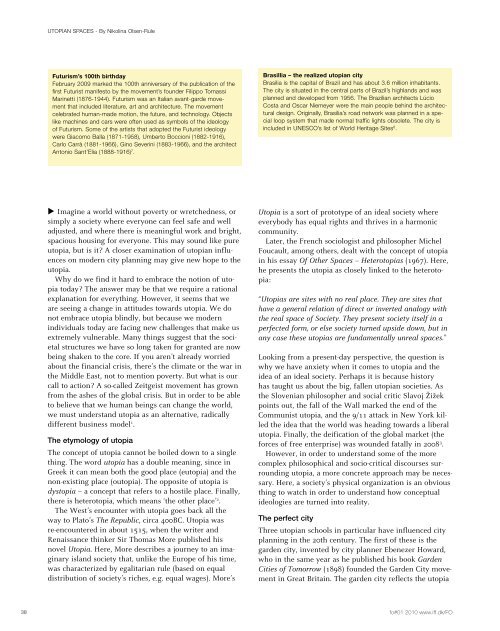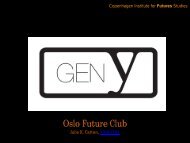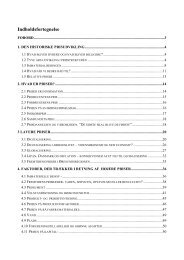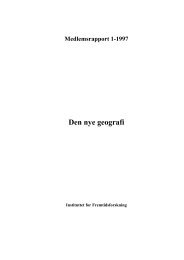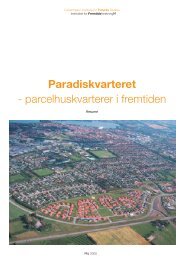Entire issue - Instituttet for Fremtidsforskning
Entire issue - Instituttet for Fremtidsforskning
Entire issue - Instituttet for Fremtidsforskning
- No tags were found...
Create successful ePaper yourself
Turn your PDF publications into a flip-book with our unique Google optimized e-Paper software.
Utopian Spaces - By Nikolina Olsen-Rule<br />
Futurism’s 100th birthday<br />
February 2009 marked the 100th anniversary of the publication of the<br />
first Futurist manifesto by the movement’s founder Filippo Tomassi<br />
Marinetti (1876-1944). Futurism was an Italian avant-garde movement<br />
that included literature, art and architecture. The movement<br />
celebrated human-made motion, the future, and technology. Objects<br />
like machines and cars were often used as symbols of the ideology<br />
of Futurism. Some of the artists that adopted the Futurist ideology<br />
were Giacomo Balla (1871-1958), Umberto Boccioni (1882-1916),<br />
Carlo Carrà (1881-1966), Gino Severini (1883-1966), and the architect<br />
Antonio Sant’Elia (1888-1916) 7 .<br />
Brasillia – the realized utopian city<br />
Brasilia is the capital of Brazil and has about 3.6 million inhabitants.<br />
The city is situated in the central parts of Brazil’s highlands and was<br />
planned and developed from 1956. The Brazilian architects Lúcio<br />
Costa and Oscar Niemeyer were the main people behind the architectural<br />
design. Originally, Brasilia’s road network was planned in a special<br />
loop system that made normal traffic lights obsolete. The city is<br />
included in UNESCO’s list of World Heritage Sites 8 .<br />
u Imagine a world without poverty or wretchedness, or<br />
simply a society where everyone can feel safe and well<br />
adjusted, and where there is meaningful work and bright,<br />
spacious housing <strong>for</strong> everyone. This may sound like pure<br />
utopia, but is it A closer examination of utopian influences<br />
on modern city planning may give new hope to the<br />
utopia.<br />
Why do we find it hard to embrace the notion of utopia<br />
today The answer may be that we require a rational<br />
explanation <strong>for</strong> everything. However, it seems that we<br />
are seeing a change in attitudes towards utopia. We do<br />
not embrace utopia blindly, but because we modern<br />
individuals today are facing new challenges that make us<br />
extremely vulnerable. Many things suggest that the societal<br />
structures we have so long taken <strong>for</strong> granted are now<br />
being shaken to the core. If you aren’t already worried<br />
about the financial crisis, there’s the climate or the war in<br />
the Middle East, not to mention poverty. But what is our<br />
call to action A so-called Zeitgeist movement has grown<br />
from the ashes of the global crisis. But in order to be able<br />
to believe that we human beings can change the world,<br />
we must understand utopia as an alternative, radically<br />
different business model 1 .<br />
The etymology of utopia<br />
The concept of utopia cannot be boiled down to a single<br />
thing. The word utopia has a double meaning, since in<br />
Greek it can mean both the good place (eutopia) and the<br />
non-existing place (outopia). The opposite of utopia is<br />
dystopia – a concept that refers to a hostile place. Finally,<br />
there is heterotopia, which means ‘the other place’ 2 .<br />
The West’s encounter with utopia goes back all the<br />
way to Plato’s The Republic, circa 400BC. Utopia was<br />
re-encountered in about 1515, when the writer and<br />
Renaissance thinker Sir Thomas More published his<br />
novel Utopia. Here, More describes a journey to an imaginary<br />
island society that, unlike the Europe of his time,<br />
was characterized by egalitarian rule (based on equal<br />
distribution of society’s riches, e.g. equal wages). More’s<br />
Utopia is a sort of prototype of an ideal society where<br />
everybody has equal rights and thrives in a harmonic<br />
community.<br />
Later, the French sociologist and philosopher Michel<br />
Foucault, among others, dealt with the concept of utopia<br />
in his essay Of Other Spaces – Heterotopias (1967). Here,<br />
he presents the utopia as closely linked to the heterotopia:<br />
“Utopias are sites with no real place. They are sites that<br />
have a general relation of direct or inverted analogy with<br />
the real space of Society. They present society itself in a<br />
perfected <strong>for</strong>m, or else society turned upside down, but in<br />
any case these utopias are fundamentally unreal spaces.”<br />
Looking from a present-day perspective, the question is<br />
why we have anxiety when it comes to utopia and the<br />
idea of an ideal society. Perhaps it is because history<br />
has taught us about the big, fallen utopian societies. As<br />
the Slovenian philosopher and social critic Slavoj Žižek<br />
points out, the fall of the Wall marked the end of the<br />
Communist utopia, and the 9/11 attack in New York killed<br />
the idea that the world was heading towards a liberal<br />
utopia. Finally, the deification of the global market (the<br />
<strong>for</strong>ces of free enterprise) was wounded fatally in 2008 3 .<br />
However, in order to understand some of the more<br />
complex philosophical and socio-critical discourses surrounding<br />
utopia, a more concrete approach may be necessary.<br />
Here, a society’s physical organization is an obvious<br />
thing to watch in order to understand how conceptual<br />
ideologies are turned into reality.<br />
The perfect city<br />
Three utopian schools in particular have influenced city<br />
planning in the 20th century. The first of these is the<br />
garden city, invented by city planner Ebenezer Howard,<br />
who in the same year as he published his book Garden<br />
Cities of Tomorrow (1898) founded the Garden City movement<br />
in Great Britain. The garden city reflects the utopia<br />
38 fo#01 2010 www.iff.dk/FO


